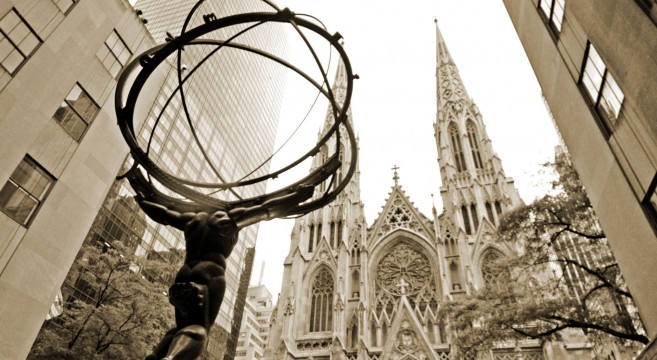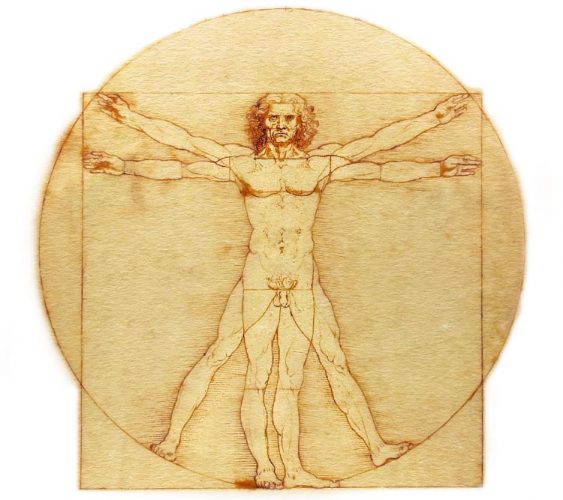Lawrence Auster (1949-2013) var en av USA:s ledande, och mest intressanta, invandringskritiker. Hans invandringskritik var en naturlig del av en traditionalistisk syn på världen, där också en kristen tro och omtanke om den västerländska civilisationen ingick. Auster ägnade en hel del tid åt att beskriva andra invandringskritiker som nihilister och/eller antisemiter, men det finns mycket av värde i hans analys av den situation både USA och Europa befinner sig i.
Tomrummet
…this postmodernist credo of yours does not, as you like to imagine, keep leading in “cool” or progressive directions; its leads to societal death, with the dead corpse of the society then being taken over by aliens.
– Auster
Auster var tydlig med att massinvandringspolitiken och etnomasochismen inte uppstått av en händelse, tvärtom följde de logiskt av andra historiska tendenser. Av central betydelse här är det Auster beskriver som ett vacuum eller tomrum. Västerlandet hade tidigare kristendomen som sin andliga kärna, men liberalism och sekularisering har avlägsnat denna kärna. Auster betonar dock att ”naturen avskyr vacuum”, tomrummet fylls därför av annat. Detta kan ibland vara liberal nihilism, ibland etnomasochism, ibland islam.
…while I’ve been saying since July 2005 that Britain is very far gone, I’ve only been saying in the last few weeks that Britain is “dead.”
– Auster
Resonemangen kring detta tomrum tillhör de centrala hos Auster, oavsett om man är kristen eller inte är det uppenbart att en civilisation har en andlig kärna och att tomrum snabbt fylls av något annat. Vill man bryta det pågående vansinnet och det Burnham kallade Västerlandets självmord måste man hantera frågan om civilisationens andliga kärna. På kort sikt måste den akuta situationen med massinvandringen hanteras, men det djupare problemet måste också tas tag i.
We need to look within and realize that the Third-Worldization of our society is but the external symptom of an illness in our own soul — the rejection of the religious faith, the moral truths, and the cultural loyalties that once made us, not a mere collection of economic actors, but a nation.
– Auster
Samtidigt är det värt att notera att Auster ofta var pessimist men aldrig defaitist. Han menade att Västerlandet som civilisation inte nått sitt naturliga slut, och att perioden av vansinne kan brytas:
…there’s never been a suicide like that of the modern West, consisting of, on one side, a civilization’s deliberate trashing of its own moral tradition and historic culture, and, on the other side, the civilization’s deliberate opening of its doors to mass influxes of immigrants of radically different race and culture whose very presence means the loss of the identity and autonomy of the historic society.
Detta kan låta mörkt, men Auster fortsätter:
The extreme nature — the sheer weirdness — of what the West is now doing to itself strongly suggests that this self-dissolution is not necessary, that the West has not reached its natural term (if there is such a thing) but rather that it is in the grip of a kind of madness, the madness of liberalism. Therefore all that is necessary for the West to reverse its suicide and at least have a fighting chance to survive is for it to stop being mad and return to sanity. And that is possible. Survival and restoration would further require, among other things, the cessation and reversal of immigration… The West is not being destroyed by some larger force over which it has no control. It is being destroyed by the lunatic ideology of liberalism that it sinfully embraces. If the West were to wake from that embrace and cast off its liberalism, it could save itself.
Att inte ens försöka rädda det kristna Västerlandet betraktar Auster som en synd. Här finns samtidigt skäl till optimism. Auster antar i likhet med Spengler och Yockey att civilisationer lever och dör, i likhet med individer kan de också mördas eller drabbas av vansinne innan de levt hela sina naturliga livsspann. Och i likhet med en tillfälligt vansinnig människa kan vår civilisation tillfriskna. Men det första steget är medvetenhet om sjukdomens väsen.

– Auster
Liberalism och nihilism
I am speaking of liberalism in its pure, modern sense, the sense in which it is most authoritative and active for us today — liberalism as non-discrimination, liberalism as non-judgmentalism, liberalism as the belief that individual rights and individual freedoms constitute the defining content of our society, the principle that rules all other principles. All of which comes down to the belief — for us, a sacred belief — that we must not define ourselves as a group, a collective whole, and therefore must not define any other group as fundamentally different from our group.
– Auster
Auster vänder sig som ovan antytt mot liberalismen. Han utgår här inte minst från Seraphim Rose (Motpolstammisar torde känna igen honom som en av Fas inspirationskällor). Med utgångspunkt i Rose identifierar Auster flera steg i nihilismens utveckling, där liberalism följs av realism/materialism, vitalism, och därefter ren, destruktiv nihilism. Detta förklarar varför liberalism, socialism och nazism följts av postmodernism och teorier kring ”rasifierade kroppar”, ”cis-gender”, ”mikro-aggressioner” och liknande. Teorier som vänder sig mot själva samhällets grunder, mot könsroller, mot familjer, mot nationsgränser, mot allt som differentierar och strukturerar.
Liberalismen leder till en oförmåga att se. Den saknar begrepp för att förstå sådant som nationer, skillnader mellan grupper, goda sociala normer, och kollektiva identiteter, och den genuina liberalen ser därför inte sådant. Auster skriver:
Either the liberals consciously hate their society and wish to see it gone, or they mentally cancel it out of existence simply by not seeing it. In the latter case, they have no consciousness of threatening or destroying anything, because the thing they’re destroying has no existence for them.
Liberalens självbild bygger på abstraktioner, Auster tar här upp betydelsen av transcendens vad gäller allt från identiteter till institutioner. Antingen har man i sin upplevelse av dem ett inslag av transcendens, då är de verkliga, eller så har man det inte. Har man det inte är de abstraktioner. Människor försvarar inte abstraktioner, liberaler har därför svårt att uppbåda den vilja och kraft som krävs för att försvara sin civilisation:
The point is, once you have abstracted your country and culture into an idea, you’ve turned yourself into a void, so there’s nothing left to defend, nor the will and energy to defend it… Liberalism, by taking over the minds and hearts and souls of the Western peoples, has literally dissolved them as peoples. Having done so, it is now leading them to their political and civilizational destruction as well.
I likhet med Schmitt betraktar Auster liberalismen som icke-politisk:
Since the liberals’ experience of their country, and thus of themselves, is of a vacuum, an emptiness lacking any substance (“we’re a tolerant, secular society”), how could they even imagine real action to defend their country against a real enemy, let alone take real action to defend it?
Han tar också upp hur den hänger samman med relativism och kulten av självet. Detta leder till tomhet och brist på mening, det leder också till den delade moralens underminering och ersättande av mjuk totalitarism. När det sociala kapitalet försvunnit måste byråkrater och lagar ta dess plats.
Det vita och västerländska USA
The non-liberal truth is that in any given society, one group or culture must be dominant and set the tone and standards for the rest. There is thus no substitute for making the decision as to which group or culture will be dominant, or, by continuing to bleat about the wonders of equality, passively letting that decision be made for us by others. Liberalism has no answer to this problem, because its only answer to all problems is to call for more equality. I therefore propose that the traditional, Anglo-European majority culture of this country, shorn of its suicidal liberal belief in the equality of all groups and cultures, be the dominant culture.
– Auster
Auster identifierar det andliga tomrummet i Västerlandet som ett grundproblem, och kopplar kristendomen till vår civilisation. Utan kristendomen som gemensam kärna kan Västerlandet inte bestå. Men detta är inte den enda grunden, Auster betraktar också Västerlandet som en civilisation grundad och upprätthållen av vita människor. När USA upphör att vara ett land med en vit majoritet upphör det också att vara USA.
Detta gjorde att han vände sig mot invandringspolitiken, avsedd att ersätta den historiska majoriteten i USA och Europa. I likhet med Yockey menade han att mindre grupper kunde assimileras i vår civilisation, men inte stora grupper:
Context and numbers are everything… A small number of people of different race can join a majority group without changing the identity of the group, because, being a small number, they act as individuals and are seen as individuals, though they may be seen as exotics.
A massive number of people of different race fundamentally changes the whole society. Then it becomes a matter, not of individuals joining an existing culture, but of one group and its culture replacing another group and its culture.
This distinction is all important. You must understand it if you are to understand the immigration problem… As we see in places throughout the country, particularly California, when a foreign people moves in en masse, they bring their culture, their way of life, their notions of law and order, their notions of right and wrong, their ethnic and national loyalties, with them. The former majority people and their way of life are pushed aside, and a new people and way of life displace them. You may THINK that culture has nothing to do with race. But that doesn’t change the fact that one people brings one culture, and displaces another people with another culture.
Auster var själv av judisk-amerikansk börd, men hade konverterat till kristendomen och identifierade sig med det vita Västerlandet. Han skrev en del även om rasskillnader, då han menade att den bristande kunskapen om detta område gjorde att vita alltid förklarade skillnader mellan gruppers framgångar med vit diskriminering. Om orsaken istället var genetiska eller kulturella skillnader skulle det inte bidra till den vita känslan av skuld. Auster skriver om detta, föga politiskt korrekt:
In my view, the greatest single factor driving whites to national suicide is their false guilt over black inferiority. Because whites believe — as modern liberalism has taught them to believe — that all groups have equal inherent abilities, they also believe that the actual inferiority of blacks in almost every area of accomplishment and behavior must be caused by something bad that the whites are invidiously doing to blacks, or by something good that whites are selfishly refusing to do for blacks. However expressed, it all comes down to the idea that black failure is caused by white racism — the transcendent sin of the modern world. And because black inferiority continues, and is even getting worse, the conclusion is that white racism is continuing, and is even getting worse.
Auster var också kritisk till de vita och deras förlust av något grundläggande. Han jämförde dem med H.G. Wells eloi:
As white America has progressively lost its belief in God, in objective truth and morality, in law, in nationhood and in race, whites have acquired an increasingly bland, complacent, pacific aspect. This seems to be true not only in the United States but in the white West as a whole. One is especially struck by this enervated quality in contemporary whites when observing them at their leisure, on Sundays, or on their innumerable vacations, or when they are shopping. In the all-white or predominantly white pockets of society, the environment is orderly and peaceful and aesthetically attractive, but something vital is missing.
Sammantaget är alltså Auster en givande bekantskap. Man håller inte nödvändigtvis med honom i allt, men det finns många insikter kring vår civilisation som är av värde. Inte minst hans perspektiv, där han tänker civilisationellt snarare än enbart dagspolitiskt. Han påminner oss också om att liberalismen är en del av problemet, inte en del av lösningen. Vi finner ett rikt arkiv med texter av Auster här:
















